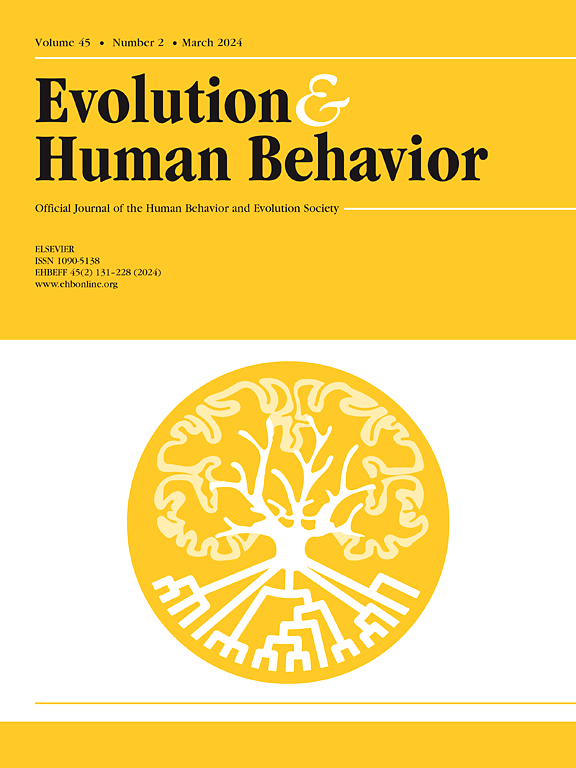对面部可信度和主导地位的感知会调节对男性面部性别二形性的早期神经反应
IF 3.2
1区 心理学
Q1 BEHAVIORAL SCIENCES
引用次数: 0
摘要
性选择可能决定了评估匿名同类间支配地位和可信度的认知机制的进化。我们利用脑电图(EEG)对男性面部支配力和可信度判断过程中男性面部形态和胡须调节早期 P100、N170、P200 和 N250 事件相关电位(ERP)成分的假设进行了检验。我们发现,面部毛发会驱动早期的 P100 神经效应,而面部的阳刚之气则会在支配感知中驱动 N170 效应。在对可信度的感知中,留胡子的面孔比胡子刮得干净的面孔有明显的 N170 峰值,而在判断面部男性气质时则没有观察到明显的效应。在支配力和可信度感知的 P200 波幅上,胡子拉碴的面孔比胡子拉碴的面孔有显著影响。在判断可信度时,胡须面孔的 N250 振幅比胡子刮得干净的面孔的 N250 振幅大,而胡子刮得干净的面孔的 N250 振幅比胡子刮得干净的面孔小。当面部留有胡须时,面部的男性气质对任何 ERPs 都没有影响,这支持了之前的研究,即面部毛发可能会掩盖面部结构上的性别二态性特征。相对于男性气质较弱的面孔,男性气质较强的面孔会增强对支配力和可信度的判断。同样,留胡子的面孔比胡子刮得干净的面孔更能增强支配力和可信度判断。我们的研究结果表明,在判断同性竞争中的自信和地位追求时,面部的男性气质会激活面部加工的神经反应,但在更多的集体行为中,面部的社会从属属性并不会被优先考虑。与此相反,面部毛发作为一种低级视觉特征,能迅速传达支配性,并在随后传达可信性,这表明在评估男性社会性属性时,面部毛发起着胜任的作用。本文章由计算机程序翻译,如有差异,请以英文原文为准。
Perceptions of facial trustworthiness and dominance modulate early neural responses to male facial sexual dimorphism
Sexual selection may have shaped the evolution of cognitive mechanisms to assess dominance and trustworthiness among anonymous conspecifics. We tested the hypothesis that masculine facial morphology and beardedness modulate early P100, N170, P200 and N250 event related potentials (ERP) components using electroencephalography (EEG) during judgments of male facial dominance and trustworthiness. We found that facial hair drove early P100 neural effects while facial masculinity drove an N170 effect during perceptions of dominance. For perceptions of trustworthiness, there was a significant N170 peak for bearded over clean-shaven faces while no significant effects were observed when judging facial masculinity. Clean-shaven faces exerted significant effects over bearded faces for P200 amplitudes for dominance and trustworthiness perceptions. The only significant N250 amplitudes occurred for beardedness over clean-shaven faces when judging trustworthiness. There were no effects of facial masculinity on any ERPs when faces were bearded, supporting previous research demonstrating that facial hair may mask sexually dimorphic structural facial traits. Masculine faces augmented judgments of dominance and trustworthiness over less masculine faces. Likewise, bearded faces enhanced dominance and trustworthiness judgments over clean-shaven faces. Our findings suggest facial masculinity activates neural responses involved in face processing when judging assertiveness and status seeking involved in same-sex competition, but not socially affiliative attributes prioritised in more communal behaviours. In contrast, facial hair acts as a low-level visual feature that rapidly communicated dominance and latterly communicated trustworthiness, suggesting a role of competence for facial hair when assessing male sociosexual attributes.
求助全文
通过发布文献求助,成功后即可免费获取论文全文。
去求助
来源期刊

Evolution and Human Behavior
生物-行为科学
CiteScore
8.30
自引率
9.80%
发文量
62
审稿时长
82 days
期刊介绍:
Evolution and Human Behavior is an interdisciplinary journal, presenting research reports and theory in which evolutionary perspectives are brought to bear on the study of human behavior. It is primarily a scientific journal, but submissions from scholars in the humanities are also encouraged. Papers reporting on theoretical and empirical work on other species will be welcome if their relevance to the human animal is apparent.
 求助内容:
求助内容: 应助结果提醒方式:
应助结果提醒方式:


